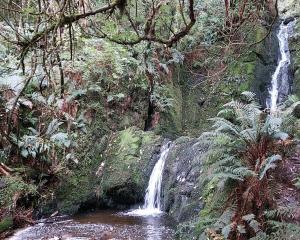Before television and mass media, advertising was dominated by the transfer of commercial logos and business brands on to bottles and crockery for the home.
The collection of such items from Dunedin in the late 1800s and early 1900s has intrigued and delighted Russell Knowles for three decades.
He has so many pieces of history, storing them has become an issue and he is embarking on a major ''down-size'' with a view to keeping a selection of the very best.
Mr Knowles (48) started collecting old bottles between 1978 and 1980 when he was at school.
His friend found a stash of historic items on a Taieri farm and his interest was ignited.
About the same time, the Otago Antique Bottle and Collectables Club was established and Mr Knowles became a member.
In two stints, he spent about 10 years as its president and also held other positions including secretary.
Today, Mr Knowles is still involved in the club, although not as president.
Some of his favourite items, allocated display space within his home, include old English match strikers for wax vestas from the 1900-20 period.
They are emblazoned with logos for Ritchie's at Staffordshire House in Dunedin, and ''T. West & Co. Hop Beer Manufacturers Dunedin.''
Mr Knowles also has four ceramic pie steamers, all with Dunedin references, as well as a 1920 John Gold & Son water jug.
Paper weight inkwells and toothbrush holders are among his other household paraphernalia used to promote Dunedin businesses between the 1860s and 1920s.
Mr Knowles used to dig for such items when he was younger, but now relies on Dunedin auction houses and antique stores as well as online trading sites and fellow collectors to add to his collection.
His job as a curator and auctioneer at Hayward's has come in handy with respect to acquiring - and getting rid of - items.
Certain things he plans to keep include a glass Thomson's lemon juice cordial dispenser and a ''1910-ish'' stoneware bed warmer from Wilkinson & Son Chemists Ltd.
His bottles of lavendar water and ''Witch's Oil'' illustrate an outdated approach to medicine, while cream jars on display boast of Boron preservative to ''prolong sweetness''.
Being a selective collector means Mr Knowles ranks items according to their rarity and visual appeal.
If choosing one representative item to keep over many, he will go for ''something a bit different''.
Case in point - an unopened bottle of Gregg's curry powder from 1910.
Mr Knowles has deviated slightly in his collecting to include Dunedin postcards, of which he has hundreds from between the 1890s and 1920s.
Most depict street scenes and prominent buildings through the decades, while others are coveted for their personal messages written on the back.
Perhaps his oldest treasure is an empty 1801 wine bottle from England, discovered during a 1960s Dunedin house renovation.
''The house was built about 1860 so the bottle must have come out with one of the early settlers and stored away to be found 100 years later.''












